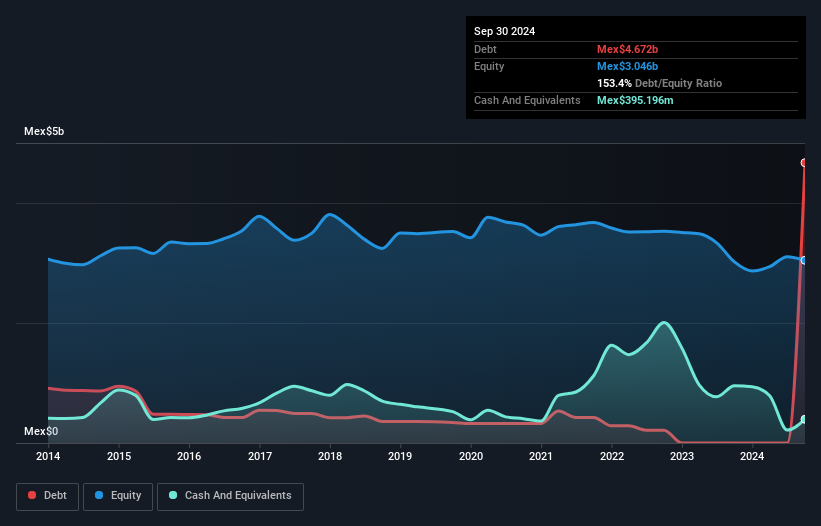The external fund manager backed by Berkshire Hathaway's Charlie Munger, Li Lu, makes no bones about it when he says 'The biggest investment risk is not the volatility of prices, but whether you will suffer a permanent loss of capital.' When we think about how risky a company is, we always like to look at its use of debt, since debt overload can lead to ruin. We note that DINE, S.A.B. de C.V. (BMV:DINEB) does have debt on its balance sheet. But the real question is whether this debt is making the company risky.
When Is Debt A Problem?
Debt is a tool to help businesses grow, but if a business is incapable of paying off its lenders, then it exists at their mercy. Ultimately, if the company can't fulfill its legal obligations to repay debt, shareholders could walk away with nothing. However, a more usual (but still expensive) situation is where a company must dilute shareholders at a cheap share price simply to get debt under control. Of course, the upside of debt is that it often represents cheap capital, especially when it replaces dilution in a company with the ability to reinvest at high rates of return. The first step when considering a company's debt levels is to consider its cash and debt together.
Check out our latest analysis for DINE. de
What Is DINE. de's Debt?
You can click the graphic below for the historical numbers, but it shows that as of September 2024 DINE. de had Mex$4.67b of debt, an increase on none, over one year. However, because it has a cash reserve of Mex$395.2m, its net debt is less, at about Mex$4.28b.

How Strong Is DINE. de's Balance Sheet?
We can see from the most recent balance sheet that DINE. de had liabilities of Mex$5.47b falling due within a year, and liabilities of Mex$778.0m due beyond that. Offsetting these obligations, it had cash of Mex$395.2m as well as receivables valued at Mex$225.0m due within 12 months. So its liabilities outweigh the sum of its cash and (near-term) receivables by Mex$5.62b.
While this might seem like a lot, it is not so bad since DINE. de has a market capitalization of Mex$15.2b, and so it could probably strengthen its balance sheet by raising capital if it needed to. But it's clear that we should definitely closely examine whether it can manage its debt without dilution. When analysing debt levels, the balance sheet is the obvious place to start. But it is DINE. de's earnings that will influence how the balance sheet holds up in the future. So when considering debt, it's definitely worth looking at the earnings trend. Click here for an interactive snapshot.
Over 12 months, DINE. de reported revenue of Mex$2.3b, which is a gain of 90%, although it did not report any earnings before interest and tax. With any luck the company will be able to grow its way to profitability.
Caveat Emptor
Even though DINE. de managed to grow its top line quite deftly, the cold hard truth is that it is losing money on the EBIT line. Indeed, it lost Mex$157m at the EBIT level. When we look at that and recall the liabilities on its balance sheet, relative to cash, it seems unwise to us for the company to have any debt. So we think its balance sheet is a little strained, though not beyond repair. However, it doesn't help that it burned through Mex$670m of cash over the last year. So suffice it to say we do consider the stock to be risky. There's no doubt that we learn most about debt from the balance sheet. However, not all investment risk resides within the balance sheet - far from it. For example, we've discovered 3 warning signs for DINE. de that you should be aware of before investing here.
When all is said and done, sometimes its easier to focus on companies that don't even need debt. Readers can access a list of growth stocks with zero net debt 100% free, right now.
New: Manage All Your Stock Portfolios in One Place
We've created the ultimate portfolio companion for stock investors, and it's free.
• Connect an unlimited number of Portfolios and see your total in one currency
• Be alerted to new Warning Signs or Risks via email or mobile
• Track the Fair Value of your stocks
Have feedback on this article? Concerned about the content? Get in touch with us directly. Alternatively, email editorial-team (at) simplywallst.com.
This article by Simply Wall St is general in nature. We provide commentary based on historical data and analyst forecasts only using an unbiased methodology and our articles are not intended to be financial advice. It does not constitute a recommendation to buy or sell any stock, and does not take account of your objectives, or your financial situation. We aim to bring you long-term focused analysis driven by fundamental data. Note that our analysis may not factor in the latest price-sensitive company announcements or qualitative material. Simply Wall St has no position in any stocks mentioned.
About BMV:DINE B
DINE. de
Through its subsidiaries, develops real estate projects in Mexico.
Acceptable track record with mediocre balance sheet.
Market Insights
Community Narratives



